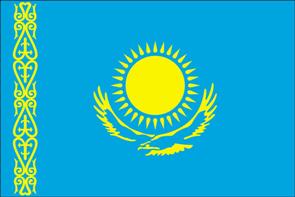
Kazakhstan envoy to India Doulat Kuanyshev Thursday appreciated the cooperation and very encouraging relationship between Kazakhstan and India over the efforts of both countries regarding global denuclearisation.
Addressing a gathering of diplomats from Central Asia, analysts, researchers and media here on the occasion of the United Nations International Day against Nuclear Tests, which is observed in remembrance of victims of nuclear-related tragedies, Ambassador Kuanyshev said that he is happy to see that his country and New Delhi are on the same platform on the significant issue of global denuclearisation.
"From Kazakhstan's point of view, it was a significant day in the year, as this was the day 22 years ago, when President Nursultan Nazarbayev officially ordered the closure of the country's biggest nuclear testing site located west of the town of Semipalatinsk," he said in New Delhi.
The Semipalatinsk Test Site (STS or Semipalatinsk-21), also known as "The Polygon", was the primary testing venue for the Soviet Union's nuclear weapons. It is located on the steppe in northeast Kazakhstan, south of the valley of the Irtysh River, near the border of East Kazakhstan Province and Pavlodar Province.
The Soviet Union conducted 456 nuclear tests at Semipalatinsk from 1949 until 1989 with little regard for their effect on the local people or environment.
According to Ambassador Kuanyshev, approximately one-and-half-million people were affected by the nuclear tests, as the full impact of radiation exposure was hidden for many years by the Soviet authorities and only came to light when the test site was closed in 1991.
He said that when the Soviet Union was disbanded on December 25, 1991, Kazakhstan inherited 1,410 nuclear weapons deployed and in storage. That count had 1,040 warheads associated with 104 SS-18 intercontinental ballistic missiles (ICBMs) stationed at Derzhavinsk and Zhengis-Tobe.1 Forty Tu-95 Bear-H bombers and 370 associated Kh-55 "Kent" nuclear-armed air-launched cruise missile (ALCM).
Ambassador Kuanyshev said that the denuclearisation of the Semipalatinsk Test Site was a major technical and diplomatic challenge for independent Kazakhstan, and took all of four years, i.e. 1991 to 1995 to dismantle with U.S. help. At that time, he said, it had the world's fourth largest nuclear weapons arsenal.
Since the U.N. had taken the decision to adopt the resolution against conducting of nuclear tests on December 2, 2009, on the intiative of Kazakhstan, he said several steps have been taken to increase awareness and educate the world population about the effects of nuclear weapon test explosions, or any other type of nuclear explosion, and the need for their cessation to ensure a nuclear weapons free world.
The Kazakh envoy said that historically India has been an ardent advocate of denuclearisation, and recalled that its first Prime Minister, Pandit Jawaharlal Nehru, had called for a complete ban of nuclear weapons in 1954. Ambassador Kuanyshev said that it was unfortunate that this was rejected by representatives of the world community at that time, and took more than half-a-century to seriously consider the benefits that could be had from denucleraisation.
Commenting on the Comprehensive Nuclear-Test-Ban Treaty (CTBT), a multilateral treaty by which states agree to ban all nuclear explosions in all environments, for military or civilian purposes, Ambassador Kuanyshev said India is one of the three countries that is yet to sign and ratify it, but he added that he understood that there were sensibilities linked to the issue as far as New Delhi was concerned.
As of June 2013, 159 states have ratified the CTBT and another 24 states have signed, but not ratified it. The treaty will enter into force 180 days after the 44 states listed in Annex 2 of the treaty have ratified it.
These "Annex 2 states" are states that participated in the CTBT's negotiations between 1994 and 1996 and possessed nuclear power reactors or research reactors at that time.
As of 2013, eight Annex 2, states that have not ratified the treaty include China, Egypt, Iran, Israel and the United States.
India, North Korea and Pakistan have not signed it.
In 1998, India said it would only sign the treaty if the United States presented a schedule for eliminating its nuclear stockpile, a condition the United States rejected.
Former Indian Ambassador to Kazakhstan Ashok Sajjanhar, who also attended the event, said that it was matter of personal satisfaction for him to see Kazakhstan taking a leadership role in global denuclearisation efforts. He said he was in Kazakhstan when the decision to close down the Semipalatinsk Test Site was taken, and the feeling then was very overwhelming.
K. Santhanam, President of the India-Central Asia Foundation (ICAF), who also spoke on the occasion, praised Kazakhstan's denuclearisation efforts, and the Embassy of Kazakhstan for hosting such a significant event. He said such efforts would go a long way in highlighting the advantages of going non-nuclear, and building up of engagement.
He also revealed that ICAF would be undertaking a month-long road show through Central Asia next month to promote greater interaction on issues pertaining to the region.
In conclusion, Ambassador Kuanyshev said Kazakhstan will observe the foundation day of its Constitution on August 30.
--With ANI Inputs--
|
|


Comments: